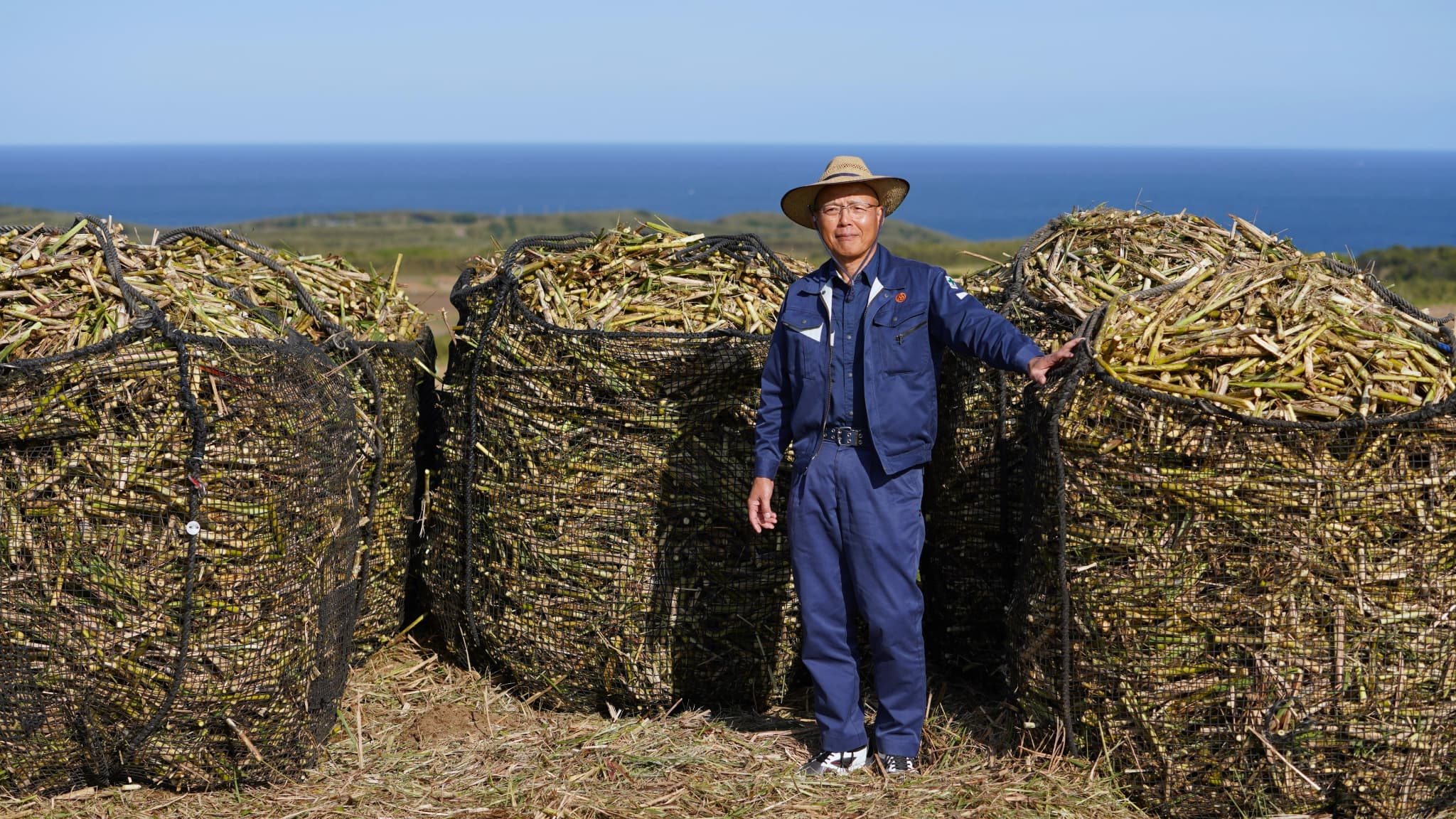
- TOP
- Enriching+TOP
- Leading Expertise in Custom Oil Orders: Inside Summit Oil Mill, Featuring Japan's No.1 Line-Up of Vegetable Oils
2025.10.3
Business
Leading Expertise in Custom Oil Orders: Inside Summit Oil Mill, Featuring Japan's No.1 Line-Up of Vegetable Oils

Established in 1968 as a joint venture between Sumitomo Corporation* and Kewpie, today Summit Oil Mill handles an unrivaled 41 varieties of oil – including edible oils, industrial oils and raw materials for health foods and cosmetics – making it Japan's leading producer in terms of line-up. Today we spoke with oil specialist Hideaki Saka about the secrets behind this production capacity and the fascinating world of vegetable oils.
-

Team Leader,
Processed Oils & Fats Team, Sales Department,
Summit Oil Mill Co., Ltd.Hideaki Saka
Saka joined Summit Oil Mill in 2001, and after working in quality control and planning and development, moved into sales in 2004. In 2015, he transferred to the plant production department, helping to support the "Omega-3 boom" that began the previous autumn. Returning to the sales department in November 2015, he's now involved in in-house product development, sales and marketing, and has been in his current post since 2024.

- From Edible Oils to Cosmetics and Thermal Underwear: The Little-Known World of Vegetable Oils
- Unique Refining Plants Handling Both Small Batches and High-Quality Vegetable Oils
- Traveling to China in Search of Seeds: "Almost Too Particular" in First Product Development
- Simple Yet Profound: Growing the Fan Base for Oils
From Edible Oils to Cosmetics and Thermal Underwear: The Little-Known World of Vegetable Oils
To begin, could you briefly explain what makes vegetable oils so appealing?
SakaWhen people hear vegetable oil, they most probably picture the cooking oils lined up in supermarkets – sesame, rapeseed, olive oil and so on; there’s a wide variety. In the past, oil was regarded as something best avoided, and it was often sold at knock-down prices. Today, however, oil is recognized as an ingredient that enhances both taste and nutrition, and consumers actively choose high-quality oils.
Vegetable oils are in fact used in many non-food products as well. Hair oils, serums and soaps all use vegetable oils as a raw material. Even the fibers of winter thermal underwear contain oil to improve their feel against the skin. And because soft capsules in health foods are made from gelatin, which cannot hold water, oil is used as the liquid content instead of water.
Summit Oil Mill refines vegetable oils* and sells them for processing, commercial and household use. We also undertake OEM product planning and development for major food manufacturers, supermarkets and other companies. For example, we produce Seijo Ishii brand olive and flaxseed oils.
During the Omega-3 boom around 2014 we received a flood of inquiries from food manufacturers. Oils such as flaxseed and perilla (egoma), which contain Omega-3, oxidize quickly and are difficult to work with. But thanks to joint product-development efforts with customers going back more than 10 years, we were ready to meet the surge in demand.

*The process of removing impurities from oil extracted from plant seeds, etc. to make it suitable for use in products.
What kinds of vegetable oils does Summit Oil Mill produce and sell?

SakaOur biggest-volume seller is rapeseed oil, which is commonly used for cooking. Oils such as rapeseed, palm and soybean are known as commodity oils because they are widely consumed. But if you look at our sales value, so-called premium oils – sunflower, safflower, corn and others that are less mainstream in Japan – account for 75 percent. We also handle specialty oils that are niche in Japan, including almond, walnut, macadamia nut, borage seed and Job's tears (adlay millet), for a total of 41 types as of August 2025.
*The process of removing impurities from oil extracted from plant seeds, etc. to make it suitable for use in products.
Unique Refining Plants Handling Both Small Batches and High-Quality Vegetable Oils
How are you able to produce as many as 41 different vegetable oils?
SakaOur product development usually starts with a customer asking, "We'd like to make this kind of product – can you produce an oil like that?" We then source raw materials, conduct analyses and pilot production, and only when we see a path to commercialization do we proceed with business negotiations. Continuing to respond to such requests has enabled us to handle such a wide variety of oils.
On the equipment side, in addition to a refining plant for mass-producing the same oil (Refining Plant A – Automation), we also have a plant for producing smaller batches of many varieties (Refining Plant B – Batch). Refining Plant A can process 100 tons per day, whereas Refining Plant B handles about 0.2–3.5 tons per day. Because each of the four major refining steps can be run independently in Refining Plant B, we can refine even small lots.


A distinctive feature of Summit Oil Mill is our dewaxing process, which removes wax from oils. Seeds such as flax and perilla have waxy seed coatings to prevent moisture loss, but this can cause oil to turn cloudy when cooled. Our equipment for the dewaxing process, known as winterizing, is rare among oil refiners.
In addition, flaxseed and perilla oils containing alpha-linolenic acid* oxidize easily and must be bottled immediately after refining. Oil is a raw product – the moment it's refined is when quality peaks. Because we can handle everything from refining to filling in one seamless process, we can produce even these more difficult oils at high quality.
*Alpha-linolenic acid is one of the Omega-3 (n-3) essential fatty acids, which are vital for normal bodily function but cannot be synthesized by the human body and must be obtained from food.
Traveling to China in Search of Seeds: "Almost Too Particular" in First Product Development
Could you tell us more about your career path?
SakaI started in quality control, where I learned the basics of oils, then moved mainly into the sales department about 21 years ago. I have also been involved in developing some products. Because my sales work often involved unusual oils, I acquired different qualifications that allowed me to give customers compelling technical explanations.

Of the products you've helped develop, which ones stand out for you?
SakaOne is sesame oil for commercial use. Sesame oil is widely used not only for food but also for aromatherapy and massages. A customer told us that when applying it to the face during treatment, some found the smell less than appealing. Massage-grade sesame oil is cold pressed, which leaves a slightly raw odor. By using our Refining Plant B equipment for deodorization, we succeeded in eliminating that odor.

Another is our in-house "41 Oils Egoma Oil." Up to this point, we had mainly produced OEM products, but we decided to create an in-house product that could coexist with customer brands while reflecting our unique expertise as an oil maker. The contents are "almost too particular" (laughs). We started by visiting farmers in cold regions of China where perilla thrives, selected the seeds with the highest alpha-linolenic acid content and had them cultivated. It took over a year to complete. For the packaging we used a double-lined bottle – common for soy sauce but rare for oils – and a black, light-shielding label to reduce oxidation.
Simple Yet Profound: Growing the Fan Base for Oils
What do you find interesting about your work at Summit Oil Mill?
SakaOil has a simple structure – one glycerin plus three fatty acids. But the type, ratio and position of each component change the characteristics. Imagine glycerin with three hands: which components it holds hands with, and in what order, makes all the difference. We do not chemically modify oils; instead, we search nature for oils whose inherent properties meet our customers' needs.

Even for a single oil such as rapeseed, we handle different types for different purposes: "LE rapeseed oil (low erucic acid)" used in margarine production; "HE rapeseed oil (high erucic acid)" used to prevent static electricity in black garbage bags; and "region-specific cold-pressed rapeseed oil" popular among discerning foodies. Composition, production and refining methods lead to completely different applications. Simple yet profound – that is the fascination of oil.

Finally, as part of the Sumitomo Corporation Group and Japan's No.1 vegetable oil producer in terms of line-up, what are your future aspirations?
SakaSumitomo Corporation has many divisions and works with customers across a diverse range of industries. Because vegetable oils have many uses, collaboration lets us offer more beneficial proposals to customers. With pushes toward sustainability permeating the market, we're receiving more inquiries about making oils from seeds left over from producing canned fruit goods or tomato sauces, for example. We'd like to work together on such upcycling initiatives.

Of the 41 vegetable oils we handle, some sell in large volumes and others don't. Yet to offer customers a diverse range of choices, we intend to keep producing all of them. This is our mission as we leverage the unique strengths of Summit Oil Mill. We want even more people to appreciate the deeply fascinating world of vegetable oils and join their growing fan base!






















